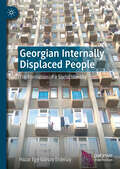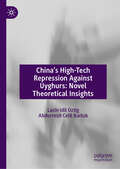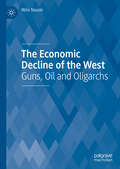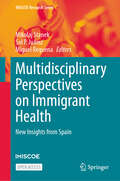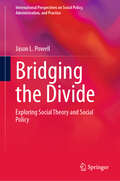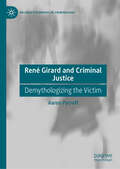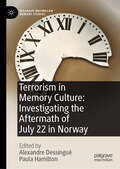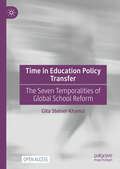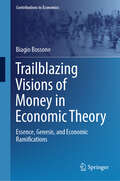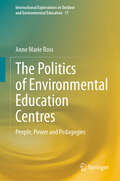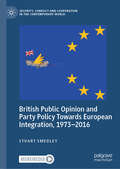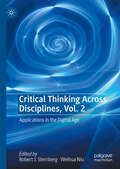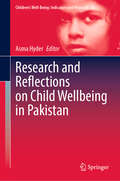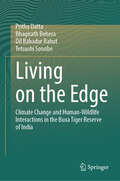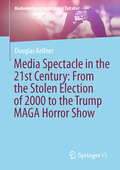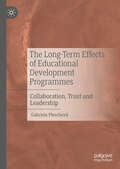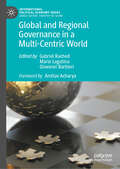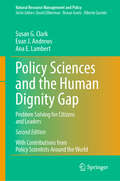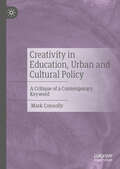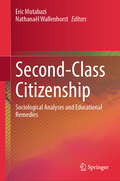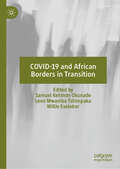- Table View
- List View
Georgian Internally Displaced People: The Formation of a Social Identity
by Hazar Ege Gürsoy ErdenayThis book explores the construction of Internally Displaced Persons (IDPs) identity as a social group in Georgia, framed through Tajfel and Turner's Social Identity Theory. It examines the key factors shaping the identity of Georgian IDPs displaced by ethnic conflicts in two major migration waves (the early 1990s and 2008) from Abkhazia and South Ossetia. Divided into two parts, the study first looks at the historical context of the ethnic conflicts and the state's responses to displacement. The second part focuses on the formation of IDP identity, analyzing how external definitions by the host community have perpetuated devaluation? throughout the post-Soviet period. It also highlights the self-perceptions, characteristics and tactics that have helped transform IDP identity from a devalued label to a more positive and resilient social identity.
China’s High-Tech Repression Against Uyghurs: Novel Theoretical Insights
by Lacin Idil Oztig Abdurresit Celil KarlukThis book explores the socio-spatial impacts of China’s high-tech repression against Uyghurs both within and beyond its borders. The study is built on surveys, in-depth interviews, and focus group discussions with the members of Uyghur diaspora in Türkiye. Findings indicate that high-tech repression minimizes the social life in East Turkestan. This type of governance aims to achieve a complete erasure of privacy and individual agency by strategically leveraging technology. While Uyghurs who escaped to Türkiye appear to gain relative freedom, our findings indicate that with China’s transnational repression mostly applied through Information and Communication Technologies (ICTs), they live in a social space which functions as a quasi-spatial extension of East Turkestan.
The Economic Decline of the West: Guns, Oil and Oligarchs
by Wim NaudéThis book argues that the West is in economic decline due to three interrelated factors, described as the Guns-Oil-Oligarchy nexus. It explains how the rise of the West as the world's current hegemon has resulted in an ecological overshoot, the rise of neoliberalism and its slash-and-burn model of continuous growth, extraction, expansion and conquest. With this model pushing against planetary boundaries, threatening ecological disaster, and depleting many resources the Guns-Oil-Oligarchy nexus has deepened its stranglehold on society. This book then dissects the Guns-Oil-Oligarchy nexus. First it describes who the Oligarchs are and how they expand and consolidate their power and influence, and stifle innovation, undermine democracy, hinder responses to climate change, and contribute to militarization and conflict. Secondly, the book explains how Oil has been essential for the economic rise of the West and how it will feature in its decline. Third, the book identifies the rise and influence of the West's Military-Industrial Complex (MIC) as contributing to the West's economic decline. It is shown that the MIC constitutes an oligarchy and, like all oligarchies, uses lobbying, campaign contributions, and control of the mainstream media to expand and consolidate power. Silicon Valley's integration into the MIC is also examined, driven by the search for new profit opportunities as traditional markets become saturated. This book shows why the Guns–Oil–Oligarchy nexus is a simple explanation for the West's economic decline, and how its understanding offers a simple solution to avert further economic decline: the oligarchs' grip must be broken.
Multidisciplinary Perspectives on Immigrant Health: New Insights from Spain (IMISCOE Research Series)
by Mikolaj Stanek Sol P. Juárez Miguel RequenaThis open access book analyses the ever-complex relationship between immigration and health in contemporary societies using the Spanish society as a case study. It addresses some of the main dimensions of migrant health in Spain, including migrant-specific vulnerability factors, health changes associated with time spent at the migratory destination, and differentiated problems of certain subpopulations of migrants. The book also examines some of the factors associated with migrant health and explores the mechanisms that might explain this nexus, such as early childhood development, adult and older age health conditions, health practices and coping skills, health culture, social support, physical environment, and access to medical care and health services. While contributing to the effort to create a more comprehensive view of the health status and outcomes of immigrants in developed societies, the book will prove to be a valuable resource to academics, health professionals, various levels of stakeholders and decision-makers, representatives of civil society, and NGOs.
Gulf South Rebels, Insurgents, and Revolutionaries, 1700-1860: Bonds of Rebellion
by Paul BarbaGulf South Rebels, Insurgents, and Revolutionaries is a collection of essays on the tangled yet variegated histories of rebellious actors in the eighteenth- and nineteenth-century Gulf South and its linked environs. Following diverse rebels, revolutionaries, militants, insurgents, opportunists, and subversives from the early eighteenth-century alluvial floodplains of Louisiana to the mid-nineteenth-century coastal prairies of southeast Texas, this volume recasts the Gulf South as a centripetal region in the history of early America, a place where worlds collided, overlapped, combined, and renewed themselves, where revolutionary fervor could thrive and percolate, mix, and coagulate. Bound together by violence, exploitation, greed, honor, family, community, and ideological commitment, Gulf South rebels drew from longer traditions of insurgency, even as they forged new ones. Their legacies would resonate well beyond their seemingly localized disturbances, from the Caribbean to western Europe, illuminating how Indigenous, Black, and Euro-American Gulf South rebels operated in a rapidly shrinking, colonial world.
International Organizational Anarchy: International Organizations as Full Actors in the Global Arena
by David Arellano-Gault Laura Zamudio-GonzálezInternational organizations are central actors on the global stage, yet their very existence is deeply shaped by their organizational nature. As entities with histories and environments, they navigate complex networks of members and stakeholders—often pursuing conflicting objectives. These organizations must operate, decide, and act amidst unforeseen events and challenges. Far from being abstract entities, international organizations embody all the complexities of organizations in the fullest sense. To survive, they must contend with anarchy: not only within the international system but also within their own structures and decision-making processes. Bridging the gap between Organization Theory and International Relations offers a promising avenue for building the concepts and case studies necessary to understand how organizational anarchy contributes to the creation of international order.
Bridging the Divide: Exploring Social Theory and Social Policy (International Perspectives on Social Policy, Administration, and Practice)
by Jason L. PowellIn today's complex and rapidly changing globe, understanding the link between social theory and social policy is crucial for addressing the diverse challenges that diverse societies face. This book aims to provide a thorough critical analysis of how social theory shapes social policy and how effective policies can be informed by theoretical frameworks emanating from history and the present. This book is both important and significant: by bridging the gap between theory and policy, this book seeks to contribute to the development of evidence-based policies that promote social cohesion, social justice, and well-being. The book is one of the first to open up theoretical strategies and applicability to social policies.
Litigating the Politics of Human Rights: Contemporary U.S. Culture Wars on Trial (Ius Gentium: Comparative Perspectives on Law and Justice #121)
by Sonja C. GroverThe cases analysed involve litigation concerning a disparate range of contemporary US culture wars including equity in access to public services unrestricted by religious bias, resistance to the teaching of historical facts relating to racial tensions in America including the so-called ‘critical race theory’ debate, the right of schoolchildren to exposure concerning a diversity of views, current USSC litigation about US university admissions policy that considers ‘race’ (ethnicity) as one factor amongst many in admission, contemporary cases concerning the constitutionality of US abortion law grounded on Roe v Wade and the scope of State and indigenous sovereign powers These contemporary culture war US landmark cases are then compared to similar cases in non-US jurisdictions and courts to consider in more depth the underlying core issues in these cases. The book highlights the risk to a democracy of recasting fundamental human rights litigation as essentially nothing more than the sorting out of political quagmires and cultural conflicts best left to the discretion of government rather than the courts. Then, the major risk is that constitutional controversies will increasingly not be decided by an independent judiciary but rather by self-interested politicians as the courts more often than not decline to weigh in on highly sensitive human rights controversies. A further risk is that instead such cases will be decided through a judicial majoritarian political lens rather than a largely apolitical consensus judicial opinion constructed by both philosophically left leaning (so-called liberal) and right leaning (so-called conservative) jurists.
René Girard and Criminal Justice: Demythologizing the Victim (Palgrave Pioneers in Criminology)
by Aaron PycroftThis book highlights the significance of René Girard's work for key criminological debates to provide new perspectives. Girard explores the causes of violence in humans and his work is used to interpret cultural phenomena related to criminology and victimology. The book focuses in particular on Girard’s cultural anthropology of the victim as being foundational to social order. The scapegoat mechanism, as developed by Girard, is an anthropological reading of myth which provides a site of rich dialogue with criminology, victimology, theology and philosophy. The book explores how this provides readers with ontological, epistemological and methodological tools for both explaining and changing the practices of justice.
Terrorism in Memory Culture: Investigating the Aftermath of July 22 in Norway (Palgrave Macmillan Memory Studies)
by Paula Hamilton Alexandre DessinguéThis edited collection examines the intersection between the developing fields of terrorism and cultural memory studies through a detailed study of the 2011 terrorist attack in Norway. It examines how the work of remembrance has been established through arts such as theatre and fiction, and also architecture, heritage and education. It traces the politics of the remembrance processes and explores the shifting meanings in public memories that change over the thirteen years since the attack, and are constantly being negotiated in response to present circumstances. It also charts general trends in memorialisation: the globalising and digitalising of memory practices, the speed of memorial initiatives, the role of testimony, and the importance of diverse narratives emerging through newer modes of communication. Chapters 10, 13 and 16 are available open access under a Creative Commons Attribution 4.0 International License via link.springer.com
Time in Education Policy Transfer: The Seven Temporalities of Global School Reform
by Gita Steiner-KhamsiThis open access book investigates a topic underexplored in policy transfer: time. Drawing on well-known theories from comparative education, public policy studies, political science, and sociology, but written in an easy-to-understand language, the author discusses seven temporalities of policy transfer: historical period, future, sequence, timing, lifespan, age, and tempo. The temporal dimension helps us understand when the current school reform, known as the school-autonomy-with-accountability reform, developed into a global script, why it conquered the globe, and how it was selectively adopted and translated into each local context. Also, for the first time in this book, the author demonstrates what exactly diffused and what “stuck,” that is, which features of the reform were eventually institutionalized. Internationally renowned for her seminal work on policy borrowing, the author systematically applies a comparative, transnational, and global perspective to capture the role of the OECD and the World Bank in advancing and accelerating the reform’s worldwide diffusion.
Trailblazing Visions of Money in Economic Theory: Essence, Genesis, and Economic Ramifications (Contributions to Economics)
by Biagio BossoneThis book challenges traditional notions and offers a new perspectives on the nature, role and use of money. It offers analyses and proposals aimed at reshaping our comprehension of money, its genesis, and its pivotal role within the economy (in particular, globalized ones). The book is structured into three parts, each tackling various facets of monetary economics, drawing from the author's prior research and confronting such fundamental quandaries as the essence of money, money's genesis by commercial banks, the economic ramifications of banks’ money creation power, the value of money (vis à vis other assets), and the implications of changes in the value of money for the policy space in globalized economies. This book aims to conceptualize innovative solutions to create more resilient and stable monetary systems while taking into account the intricate interplay between money, banks and government budgets in today's globalized economic landscape. Overall, the book strives to provide a thorough and thought-provoking examination of monetary theory, using novel approaches to offer new perspectives. By taking an interdisciplinary view, including accounting, physics and economics, the book challenges conventional wisdom and encourages a re-evaluation of established paradigms.
The Politics of Environmental Education Centres: People, Power and Pedagogies (International Explorations in Outdoor and Environmental Education #17)
by Anne Marie RossThis book juxtaposes a representation of environmental education centres around the globe with centres within the New South Wales Department of Education in Australia. As terminology shifted from nature study and conservation education to environmental education then “environmental and sustainability education” within “sustainable development” the centres embodied and encompassed this evolution. The book traces the centres’ journeys through the phenomenon of the 1970s growth in socially conscious governance, to 1980s-1990s public managerialism, to the tightening tentacles of capitalism. The complexity of education as a socio-political endeavour is made explicit. Themes including the changing dynamics of caring for the environment, and bureaucratic and political manoeuvring, in addition to the effects of activism and globalisation are viewed through a centre lens as the centres survive and thrive in ever increasing neoliberal times. The book will appeal to teachers, academics and bureaucrats interested in the history and politics of environmental education.
British Public Opinion and Party Policy Towards European Integration, 1973–2016 (Security, Conflict and Cooperation in the Contemporary World)
by Stuart SmedleyThis book provides the first detailed historical account of British public opinion and party policy towards European integration from 1973 (the year in which the UK joined the European Community) to 2016 (the year in which the UK voted to leave the European Union). It takes a thematic approach towards this subject, exploring party policy and public opinion towards significant developments in the European integration process during the period covered. These include moves towards deeper and flexible integration, economic and monetary union, the Single Market, enlargement, and foreign and defence policy cooperation. The author assesses the nature of British public opinion towards these developments - some of which Britain's government and main political parties supported, and others which they opposed - and analyses the extent to which party policies reflected public opinion.
Critical Thinking Across Disciplines, Vol. 2: Applications in the Digital Age
by Robert J. Sternberg Weihua NiuThis edited collection takes a multidisciplinary approach to critical thinking, drawing together leading experts to examine its application to contemporary societal issues including AI, misinformation, and health communication. Where Volume 1 initiated a dialogue between disciplines to enable a deeper understanding of critical thinking, Volume 2 considers how we might best apply critical-thinking skills to meet challenges in our everyday lives. Drawing together leading experts from disciplines including psychology, philosophy, education, and creativity studies, the book&’s authors consider topics ranging from conspiracy beliefs and bio-ethics, to multiculturalism and social justice. This compelling work offers fresh insights for students, scholars and those with a general interest in the application and development of critical thinking skills.
Research and Reflections on Child Wellbeing in Pakistan (Children’s Well-Being: Indicators and Research #30)
by Asma HyderThe essays in this collection explore the multifaceted crises affecting children in Pakistan, emphasizing the urgent need for intervention. The chapters address a wide range of themes, from the quality of immunization and education to more intricate issues within homes and family settings, such as indoor air pollution, parental smoking and substance use, and child marriages. Broader societal challenges, including the impact of developmental projects, conflicts, and climate change, are also examined. This book aims to offer innovative and evidence-based insights to professionals, researchers, students, and NGOs with an interest in child welfare. It serves as a resource for those looking to prioritize children’s wellbeing in their future research endeavors. By integrating perspectives from diverse social science disciplines into a single volume, the book contributes significantly to the empirical literature on children’s issues in the Pakistani context.
Living on the Edge: Climate Change and Human-Wildlife Interactions in the Buxa Tiger Reserve of India
by Tetsushi Sonobe Pritha Datta Bhagirath Behera Dil Bahadur RahutIn a rapidly changing climate, understanding the complex interactions between humans and wildlife is crucial for fostering coexistence. This book offers an in-depth analysis of how climate change exacerbates conflicts between local communities and wildlife in the Buxa Tiger Reserve. Through historical insights, current challenges, and community narratives, it reveals the adaptive strategies employed by villagers and their unintended consequences on wildlife. Readers will gain valuable insights into the cascading effects of these conflicts and find evidence-based policy recommendations aimed at promoting sustainable and harmonious coexistence. Essential for conservationists, policymakers, and anyone interested in sustainable development, this book provides practical solutions for mitigating human-wildlife conflicts in the face of climate change.
Media Spectacle in the 21st Century: From the Stolen Election of 2000 to the Trump MAGA Horror Show (Medienkulturen im digitalen Zeitalter)
by Douglas KellnerThis book offers an original analysis of the primacy of media spectacle in the politics, social history, and major events of the 21st century which highlights the importance of critical analysis and interpretation of broadcasting, the Internet, and social meaning in understanding the key historical events and the multiple factors that produce them during the contemporary era. The text explores how broadcasting and digital media constitute the major media spectacles of our time and how they in turn present the key issues, challenges, conflicts, and problems of the present era. Thus understanding broadcasting and digital media help us to understand our contemporary society, politics, and culture and to play a more active role in understanding and participating in our contemporary media societies and environments. Kellner argues throughout for the need for critical media and digital literacies to empower students and citizens to become active participants in our media society and technoculture and to understand the key events and challenges of contemporary life. Douglas Kellner has been researching, writing about, and lecturing upon the major topics and studies in this book for the last several decades and this book brings together key aspects of his work on theorizing, analyzing, and evaluating the role of effects of major media spectacles of the 21st century.
The Long-Term Effects of Educational Development Programmes: Collaboration, Trust and Leadership
by Gabriela PleschováThis book investigates the long-term effects of educational development (ED) programmes on teaching perceptions and practices. The research draws comparisons between an ED programme at a university in the United Kingdom dedicated to advancing teaching, an international university where high-quality education is central to its mission, and two universities in Central and Eastern Europe with an ambition to rise in rankings and attract international students. It examines collaboration, trusting relationships and leadership as key drivers of effective practices. The book is a valuable resource for researchers, educational developers and higher education leaders .
State Capture in the Militarized Fight Against Illegal Small-Scale Goldmining in Ghana
by Jasper Abembia Ayelazuno Maxwell Akansina AziabahThis slim book addresses one of the most vexed questions about governance and politics in natural resources-rich, albeit poor, countries across the world. Why have most states in natural resources-rich developing countries failed to regulate their artisanal and small-scale mining (ASM) industries? This failure is both intellectually and politically puzzling, because these same states demonstrate capability in different functions and regulations of other sectors of the economy. Ghana is a quintessential example of this puzzle. Despite its legendary reputation as a relatively well-governed, peaceful, and democratic country, its ASGM sector is characterized predominantly by informality, criminality, and horrendous environmental and human-development effects, which include the ferocious denuding of the country’s vegetation cover, toxic pollution of water bodies, and serious health and safety hazards inflicted on the rural populace in mining areas. This book seeks to contribute a fresh state-theoretical perspective, state capture, to unravel this puzzle. It argues that the chaotic, criminal, and ruinous Ghanaian ASGM sector – known in Ghanaian parlance as the galamsey menace – is caused by state capture. The Ghanaian state has been captured by the mining power-elites, something that allows them to undertake criminal and destructive mining with impunity. These state captors are not doing artisanal and small-scale mining (ASM), but rather capitalist mechanized mining (CMM), which ravages the environment on a large scale and with breakneck speed. State capture in Ghana’s ASGM sector is demonstrated clearly in the book through vivid description and rigorous analysis of the failed militarised fight against the galamsey menace between 2017 and 2022. This is the period the Head-of-State and Commander-in-Chief of the Ghana Armed Forces (GAF) vowed to fight and defeat the perpetrators of this crime at the risk of losing his presidency. He then declared war on the perpetrators and commandeered the coercive apparatuses of state, led by the GAF, to fight it. The book argues that the state failed spectacularly to win this war, the evidence of which is the aggravation of the deleterious environmental and human effects of galamsey. For example, the rivers and water bodies of Ghana have witnessed unprecedented levels of poisoning with lethal chemicals. The rural populace in mining communities is inflicted with serious maternal and neonatal health hazards, such as hideous congenital and physical disorders of some babies born in these communities, and sadly, the deaths of these babies. Why, despite its overwhelming coercive capacity, did the Ghanaian state fail to win a war against a weak enemy: galamsey operators, who are mostly unarmed civilians, and operating in plain sight of state agencies? Using the lens of state captured, this book addressed this question, offering fascinating and penetrating insights into the puzzle. Being the first to do this, the book contributes to advancing theory, methods, and political praxis in the study and governance of the ASM industry in Ghana. As failed military crackdowns on illegal ASM are common across natural resources-rich developing countries, the contribution this book makes may be germane to these countries in, say, Latin America and Asia.
Global and Regional Governance in a Multi-Centric World (International Political Economy Series)
by Maria Lagutina Gabriel Rached Giovanni BarbieriIn a world shaken by constant crises and shifting power dynamics, Global and Regional Governance in a Multicentric World delves into the core of the global governance system, exploring its flaws, its evolution, and the forces seeking to reshape it. As the Western-crafted liberal order faces unprecedented scrutiny, this book provides a timely analysis of how emerging powers - China, Brazil, India, South Africa, and others - are challenging traditional governance models, proposing alternatives that better reflect their values, interests, and aspirations. From Asia to Africa, Latin America to Eurasia, this book examines how these regions, collectively known as “the Rest” or “the Global South,” are responding to the shortcomings of a global system long dominated by Western interests. Through insightful regional studies, the authors highlight how “rising powers” are no longer willing to remain peripheral players; instead, they are pushing for a more inclusive, representative, and effective global framework. Rooted in the latest international relations trends, this book offers an incisive exploration of new governance models emerging in a “multi-centric” world. It raises pressing questions about global stability as follows: Will these rising powers succeed in transforming the global order? How do they envision international cooperation? Can their ideas coexist with established Western powers? Through this work, readers gain a nuanced understanding of the forces shaping tomorrow’s world and the potential pathways for reform. Ideal for scholars, policymakers, and those with a keen interest in world affairs, Global and Regional Governance in a Multicentric World is a compelling call to rethink contemporary global governance and the possible paths of the international agenda in an era where traditional multilateralism is no longer able neither sufficient to address the pressing challenges from our interconnected world.
Policy Sciences and the Human Dignity Gap: Problem Solving for Citizens and Leaders (Natural Resource Management and Policy #60)
by Susan G. Clark Evan J. Andrews Ana E. LambertThis book presents a comprehensive and actionable framework for individuals and leaders seeking to promote human dignity within healthy environments. Rooted in the policy sciences approach, it equips readers with the essential concepts, tools, and skills necessary to address indignity and unhealthy conditions collectively. Despite international commitments and domestic laws advocating for human dignity, a glaring "human dignity gap" persists in numerous regions and problem contexts. This book sheds light on this disparity, examining its manifestations in global environmental change, development efforts, water insecurity, wildfires, human-wildlife conflict, access to public health, and much more. While existing scholarship often focuses on legal rights, the authors emphasize untapped opportunities for everyday citizens and leaders to foster human dignity within their communities and beyond. By offering fresh perspectives, practical concepts, and exercises, this book empowers readers to bridge the performance gap, ultimately enabling the realization of human dignity from the grassroots level. It provides innovative strategies and frameworks to address this pressing global issue, making it an invaluable resource for scholars, policymakers, and concerned citizens alike.
Creativity in Education, Urban and Cultural Policy: A Critique of a Contemporary Keyword
by Mark ConnollyThis book critiques creativity as a ‘keyword’ in contemporary society. This is illustrated through an analysis of the uses of creativity within cultural, urban and educational policy. While there have been critiques and debates of the uses of creativity within these fields, the author innovatively bridges these disciplines by providing both an overview of the philosophical and ideological underpinnings of these debates and illustration of how they manifest in these distinct, yet interrelated policy spheres. Drawing on Raymond Williams’ theory of culture as social communication and keyword approach, the book illustrates how the creative turn in contemporary policy can divert attention from structural analysis and provide a rhetorical gloss for inequitable social policies. It will appeal to academics, students and practitioners involved in education, cultural and urban studies.
Second-Class Citizenship: Sociological Analyses and Educational Remedies
by Nathanaël Wallenhorst Eric MutabaziA number of features of the contemporary period are preventing people from exercising their citizenship: the acceleration and permanent change in the conditions shaping habitability of planet Earth, the digital and techno-scientific revolution, the rise of religious and political radicalisation, the explosion of social inequalities, the hegemony of the economic drive to maximise individual interests, etc. For many individuals, citizenship appears to be prevented at the first hurdle. What is more, though officially or legally, it is not possible to speak of second-class citizenship-- so what can be done when the actors themselves use such terminology? There is something essential here which must be taken into account as a basis for thinking about the social, its inequalities and its injustices. The authors of this book propose the notion of 'second-class citizenship' as a way of thinking about the scale of contemporary social and political inequalities. In view of this observation, the contributors outline a movement based on the conviction that education is the repository of the power to prepare for the future. How can we learn to build a shared world together and overcome the obstacles that prevent us from doing so? How can we learn new habits of relationships marked by responsibility and hospitality? The collective reflection in this book lends credence to the way in which players talk about their experience, even experiencing differences in their ability to participate in the mechanisms of power. This book presents empirical studies and conceptual tools for thinking about the impact of economic factors on the ways in which citizens participate in the decisions of power. This book is particularly suited for educators as well as policy-makers and researchers.
COVID-19 and African Borders in Transition
by Leon Mwamba Tshimpaka Samuel Kehinde Okunade Willie EseleborThis edited book explores the realities in various borderlands across Africa vis-à-vis the complexities that have emerged with the upsurge of COVID-19, which put the world at a standstill. In other words, it investigates the changing dynamics of borders and bordering in Africa, with a specific focus on how borders were managed before, during and in the aftermath of COVID-19 restrictions on global mobility. The evolving nature of threats associated with COVID-19 has led to border closures (land, sea and air), calling our attention to the current state of emergency preparedness in the context of cross-border-related health threats, risk characterization, crisis management, emergency risk communication, capacities and capabilities for prevention and control. However, borders and frontiers are located on the periphery, limiting the early warning and response capabilities of states. This book marks a comprehensive and field-defining analysis through its questioning of what kind of transitions have occurred in African borderlands and our perceptions as to how borders and bordering have traditionally been viewed and upheld.
